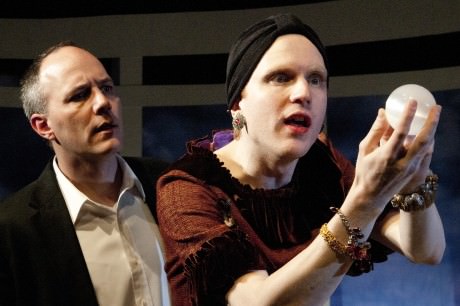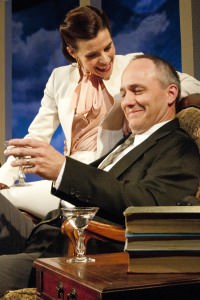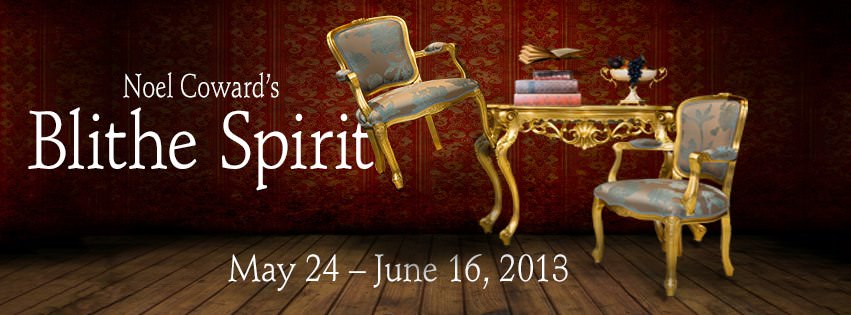Blithe Spirit at 1st Stage in Tysons is a guilty pleasure on two levels. First, it lets you take a peek at paranormal stereotyping and second, it lets you glimpse how different a first and second marriage can be.
The play by Noel Coward is set in 1941 in Kent, United Kingdom, where author Charles Condomine (Steven Carpenter) and his second wife, Ruth (Liz Mamana), invite a local psychic, Madame Arcati (Evan Crump), to conduct a a séance.

Charles’s sophisticated marriage with Ruth is established early by their intelligent repartee, which reveals that they are hosting the psychic only to get jargon and tricks of the trade for Charles’s next book. Madame Acarti sweeps in and uses all the standard methods of mediumship: knocking, calling forth a guide from the other side and going into a trance to contact a spirit. Soon Charles’s first wife, Elvira (Dani Stoller), who died seven years ago, vamps her way onto the stage and Charles’s first marriage is sizzling once again.
Only Charles can see and hear her, so Ruth believes some of his words are leveled at her. She flares her nostrils–and every other part of her face–in anger. She projects incredulity so well that no one in the 110-person audience could miss it. Mamana’s is a smart, well-studied character portrayal. Every time she goes on stage it is clear that she has been planning a different approach to Charles’ odd behavior.
“I want you to know that the ghost of my former wife is right here in this room,” Charles says.
“Yes dear,” Ruth replies.

Carpenter plays a convincing Charles and his character development is also fun to follow. He is disbelieving, astounded, angry, attracted to Elvira and appreciative of Ruth, and then he decides that it is great to have them both around. This makes it easier for Elvira to make mischief, and Stoller does so with glee. She toys cruelly with the nervous maid, Edith (Maureen O’Rourke), who tiptoes around with trepidation even before the medium arrives.
Madame Arcati’s personality could be flaky but Crump brings her down to earth by stressing a few normalcies: she rides a bike and worries that it will get stolen, eats heartily of cucumber sandwiches and drinks warm Ovaltine when she gets home at night. She is a little bland despite her command of the séance table and the crystal ball—perhaps Crump’s portrayal is meant to signify that her detachment comes from psychic drain.
Director Lee Mikeska Gardner refined the body language of the characters skillfully. The maid’s is the most obvious as she cringes through her duties. It is almost too repetitive, but as a tip-off that movement will tell a good portion of the story, it is brilliant. Ruth grows increasingly uptight and at the peak of anger she hitches her shoulders sideways as if wracked by pain. Elvira either stretches out her arms and legs like doll when planning mischief or drapes herself on the furniture sexily. Charles alternates between distinguished restraint and covert fury until he leans back open-armed as if to say “Oh yeah baby!” Madame Arcati wafts about with her eyes closed and her nose raised as if searching for otherworldly presences. The dinner guests, Dr. and Mrs. Bradman (Philip Hosford and Jenna Berk) depict a trophy-wife couple in which she a controls him with her feminine wiles and he follows along willingly.
The crew uses a lot of blue colors in the staging: Steven Royal’s set and David Sexton’s lights include a dais illuminated by blue lights underneath; the scrims depict blue sky covered with white clouds. Royal (who also provides the costumes) constructed a dress for Elvira in shades of blue as if to underscore that she has returned from beyond. Cindy Landrum Jacobs’ more earthly toned props include brown tapestry upholstery that seems appropriate to the time. However Royal’s sweeping curve of windows seem more suited to a mid-century New York penthouse than a 1940’s home in Kent. Maybe they represent a window into the heavens, but the furniture is so staid and the play so secular that it did not work for me.
The dialect coach, Jane Margulies Kalbfeld, helped the actors distinguish between the cockney accent of the maid and the classes of London accents almost as well as in Downton Abbey. It was fun to listen to the differences.
The enjoyable program gives a secondary definition of blithe that is more appropriate to the play than the primary definition of blithe as “happy”. It is “without thought or regard, carefree; heedless. A blithe indifference to anyone’s feelings.” Charles and Ruth’s use of Madame Arcati as material for the novel is blithe, but while they eventually get their comeuppance, Madame Arcati earns cred with her professional society for having manifested a protoplasmic spirit.
Who is the blithe one now? You certainly will be if you go to 1st Stage’s production of Blithe Spirit. It is good fun on many levels.
Running time Two hours plus one 15-minute intermission.
Blithe Spirit plays through June 16, 2013 at 1st Stage – 1524 Spring Hill Road, in McLean, VA. For tickets, call the box office at (703) 854-1856, or purchase them online.





